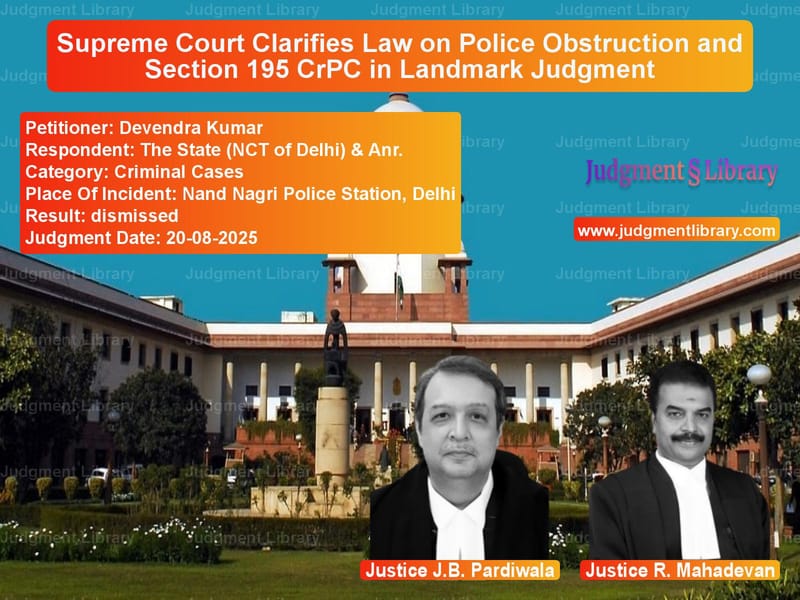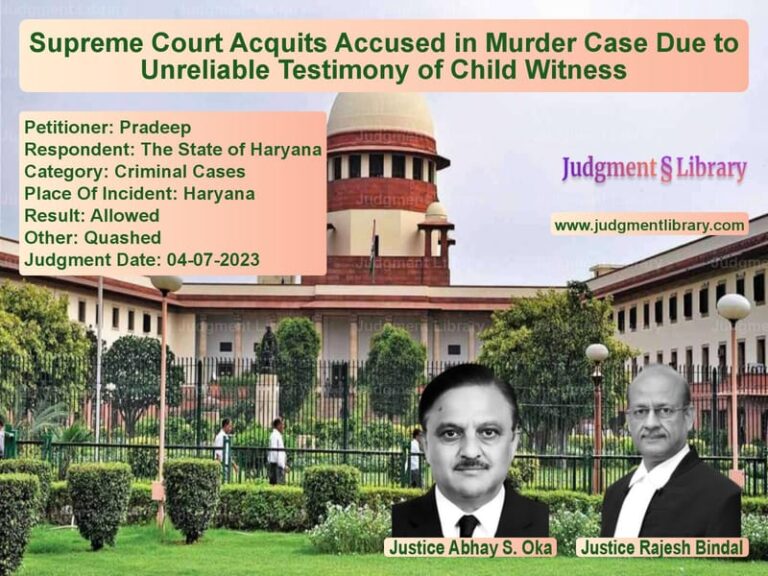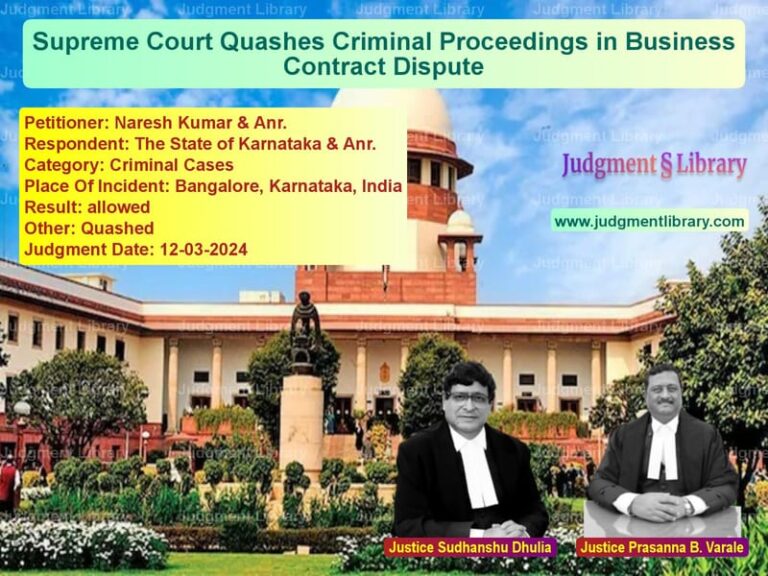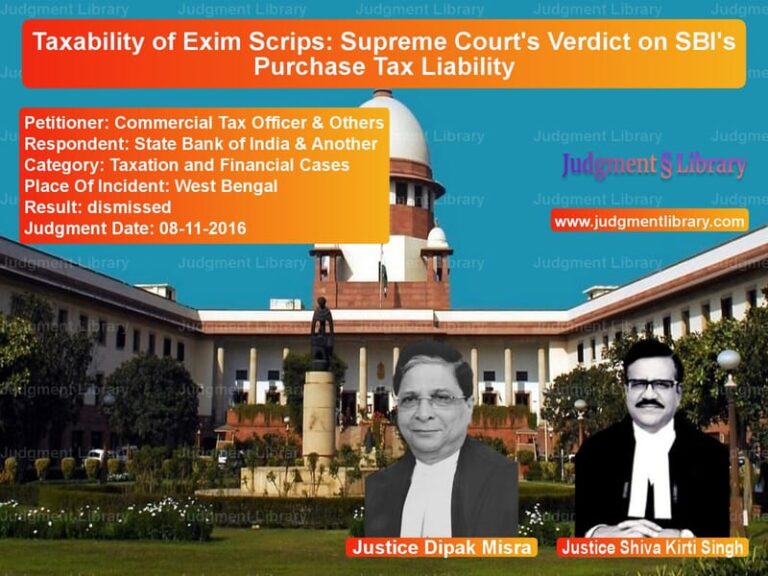Supreme Court Clarifies Law on Police Obstruction and Section 195 CrPC in Landmark Judgment
In a significant judgment that clarifies important legal principles regarding obstruction of public servants and the procedural requirements for prosecuting such offences, the Supreme Court has delivered a comprehensive ruling in a case involving a police officer accused of obstructing a court process server. The case, which has been pending for over twelve years, raised crucial questions about the interpretation of Section 186 of the Indian Penal Code and Section 195 of the Code of Criminal Procedure.
The dispute originated from an incident on October 3, 2013, when Ravi Dutt Sharma, a process server from the Nazarat Branch in Shahdara, Delhi, went to Nand Nagri police station to serve court warrants and summons. According to Sharma’s complaint, he faced significant obstruction from police officials, particularly Inspector Devendra Kumar, the Station House Officer. The process server alleged that when he insisted on getting a proper receipt for the served documents, the police officials misbehaved with him, made him stand with his hands raised for half an hour as punishment, forced him to sit on the floor for 3-4 hours, and detained him at the police station until 4:30 PM.
The matter was brought to the notice of the District and Sessions Judge of Shahdara, who assigned the complaint to the Administrative Civil Judge. The Civil Judge then lodged a private complaint in the court of the Chief Metropolitan Magistrate, who directed the registration of an FIR under Sections 186 (obstructing public servant) and 341 (wrongful restraint) of the Indian Penal Code. This order was challenged through various legal forums until it reached the Supreme Court.
The petitioner, Devendra Kumar, through his counsel Mr. Nikilesh Ramachandran, made several key arguments before the Supreme Court. He contended that “even if the entire case put up in the FIR is believed to be true or accepted to be true, none of the ingredients to constitute the offence punishable under Section 186 of the I.P.C. could be said to be disclosed.” The counsel further argued that “mere obstruction is not enough unless it is accompanied by use of some criminal force” and that “no order could have been passed in exercise of powers under Section 156(3) of the Cr.P.C. for the registration of an offence under Section 186 of the I.P.C. as the same is encompassed within Section 195(1)(a) of the Cr.P.C.”
The Supreme Court, in its judgment delivered by Justices J.B. Pardiwala and R. Mahadevan, provided extensive clarification on the legal issues involved. The court first addressed the meaning of ‘obstruction’ under Section 186 IPC, noting that “the expression ‘obstruction’ used in Section 186 of the I.P.C. is not confined to physical obstruction only. Threats of violence made in such a way as to prevent the public servant from carrying out his duty might easily amount to an obstruction of the public servant.”
The court elaborated further on this point, stating that “the expression ‘obstruction’ used in Section 186 of the I.P.C. is not confined to physical obstruction. It need not necessarily be an act of use of criminal force. The act need not be a violent one. It is enough if the act complained of results in preventing a public servant in discharge of his lawful duties. Any act of causing impediment by unlawfully preventing public servant in discharge of his functions would be enough to attract Section 186 of the I.P.C.”
The judgment also made important observations about the procedural aspects of the case, particularly criticizing the Chief Metropolitan Magistrate’s decision to direct police investigation under Section 156(3) CrPC instead of directly taking cognizance of the complaint. The court noted that “the Chief Metropolitan Magistrate should have straightaway taken cognizance upon the said complaint and issued process to the petitioner-herein. Asking the police to investigate the complaint under Section 156(3) of the Cr.P.C. was a very serious error that the Chief Metropolitan Magistrate could be said to have committed.”
The court emphasized the importance of maintaining judicial dignity, observing that “in the present case, the dignity of the court was at stake. There is lot of sanctity attached to a complaint lodged by none other than a civil judge.” The judges expressed concern over the prolonged litigation, remarking that “the entire trial would have been over within a period of three months from the date of filing of the complaint in writing, had the CMM taken cognizance on the very first day and issued process under Section 204 of the Cr.P.C. Having not done so at the right time and in the right manner, it has been now twelve years that this litigation is still pending.”
On the crucial issue of Section 195 CrPC, the court provided comprehensive guidance, stating that “Section 195(1)(a)(i) of the Cr.P.C. bars the court from taking cognizance of any offence punishable under Sections 172 to 188 respectively of the I.P.C., unless there is a written complaint by the public servant concerned or his administrative superior, for voluntarily obstructing the public servant from discharge of his public functions.”
The court also clarified the relationship between police investigation and Section 195 restrictions, noting that “Sections 195(1)(b)(i)(ii) & (iii) and 340 of the Cr.P.C. respectively do not control or circumscribe the power of the police to investigate, under the Criminal Procedure Code. Once investigation is completed then the embargo in Section 195 would come into play and the Court would not be competent to take cognizance.”
In its concluding remarks, the Supreme Court disposed of the petition while leaving it open for the petitioner to raise the contention regarding the bar of Section 195 CrPC before the trial court if a chargesheet is filed after investigation. The court also directed that “Registry shall circulate one copy each of this judgment to all the High Courts,” indicating the importance of this ruling for guidance across the judiciary.
This judgment serves as an important precedent on multiple legal fronts – it clarifies that obstruction under Section 186 IPC doesn’t require physical force but includes any act that impedes a public servant’s duties, it emphasizes the proper procedure for handling complaints by public servants, and it provides crucial interpretation of Section 195 CrPC’s application at different stages of criminal proceedings. The court’s strong remarks about judicial dignity and the need for expeditious handling of cases involving obstruction of court officials send a clear message about maintaining the authority and effectiveness of the judicial process.
Petitioner Name: Devendra Kumar.Respondent Name: The State (NCT of Delhi) & Anr..Judgment By: Justice J.B. Pardiwala, Justice R. Mahadevan.Place Of Incident: Nand Nagri Police Station, Delhi.Judgment Date: 20-08-2025.Result: dismissed.
Don’t miss out on the full details! Download the complete judgment in PDF format below and gain valuable insights instantly!
Download Judgment: devendra-kumar-vs-the-state-(nct-of-de-supreme-court-of-india-judgment-dated-20-08-2025.pdf
Directly Download Judgment: Directly download this Judgment
See all petitions in Custodial Deaths and Police Misconduct
See all petitions in Fraud and Forgery
See all petitions in Bail and Anticipatory Bail
See all petitions in Contempt Of Court cases
See all petitions in Legal Malpractice
See all petitions in Judgment by J.B. Pardiwala
See all petitions in Judgment by R. Mahadevan
See all petitions in dismissed
See all petitions in supreme court of India judgments August 2025
See all petitions in 2025 judgments
See all posts in Criminal Cases Category
See all allowed petitions in Criminal Cases Category
See all Dismissed petitions in Criminal Cases Category
See all partially allowed petitions in Criminal Cases Category







